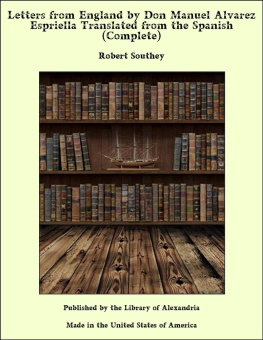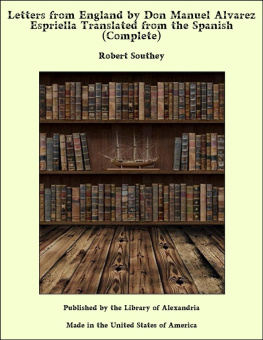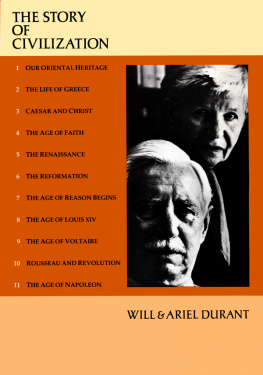Voltaire - Letters on England
Here you can read online Voltaire - Letters on England full text of the book (entire story) in english for free. Download pdf and epub, get meaning, cover and reviews about this ebook. genre: Science. Description of the work, (preface) as well as reviews are available. Best literature library LitArk.com created for fans of good reading and offers a wide selection of genres:
Romance novel
Science fiction
Adventure
Detective
Science
History
Home and family
Prose
Art
Politics
Computer
Non-fiction
Religion
Business
Children
Humor
Choose a favorite category and find really read worthwhile books. Enjoy immersion in the world of imagination, feel the emotions of the characters or learn something new for yourself, make an fascinating discovery.
Letters on England: summary, description and annotation
We offer to read an annotation, description, summary or preface (depends on what the author of the book "Letters on England" wrote himself). If you haven't found the necessary information about the book — write in the comments, we will try to find it.
Letters on England — read online for free the complete book (whole text) full work
Below is the text of the book, divided by pages. System saving the place of the last page read, allows you to conveniently read the book "Letters on England" online for free, without having to search again every time where you left off. Put a bookmark, and you can go to the page where you finished reading at any time.
Font size:
Interval:
Bookmark:
The Project Gutenberg eBook, Letters on England, by Voltaire, Edited by
Henry Morley
This eBook is for the use of anyone anywhere at no cost and with
almost no restrictions whatsoever. You may copy it, give it away or
re-use it under the terms of the Project Gutenberg License included
with this eBook or online at www.gutenberg.net
Title: Letters on England
Author: Voltaire
Release Date: April 22, 2005 [eBook #2445]
Language: English
Character set encoding: ISO-646-US (US-ASCII)
***START OF THE PROJECT GUTENBERG EBOOK LETTERS ON ENGLAND***
Transcribed from the 1894 Cassell & Co. edition by David Price, email ccx074@coventry.ac.uk
by Voltaire
Franois Marie Arouet, who called himself Voltaire, was the son of Franois Arouet of Poitou, who lived in Paris, had given up his office of notary two years before the birth of this his third son, and obtained some years afterwards a treasurers office in the Chambre des Comptes. Voltaire was born in the year 1694. He lived until within ten or eleven years of the outbreak of the Great French Revolution, and was a chief leader in the movement of thought that preceded the Revolution. Though he lived to his eighty-fourth year, Voltaire was born with a weak body. His brother Armand, eight years his senior, became a Jansenist. Voltaire when ten years old was placed with the Jesuits in the Collge Louis-le-Grand. There he was taught during seven years, and his genius was encouraged in its bent for literature; skill in speaking and in writing being especially fostered in the system of education which the Jesuits had planned to produce capable men who by voice and pen could give a reason for the faith they held. Verses written for an invalid soldier at the age of eleven won for young Voltaire the friendship of Ninon lEnclos, who encouraged him to go on writing verses. She died soon afterwards, and remembered him with a legacy of two thousand livres for purchase of books. He wrote in his lively school-days a tragedy that afterwards he burnt. At the age of seventeen he left the Collge Louis-le-Grand, where he said afterwards that he had been taught nothing but Latin and the Stupidities. He was then sent to the law schools, and saw life in Paris as a gay young poet who, with all his brilliant liveliness, had an aptitude for looking on the tragic side of things, and one of whose first poems was an Ode on the Misfortunes of Life. His mother died when he was twenty. Voltaires father thought him a fool for his versifying, and attached him as secretary to the Marquis of Chteauneuf; when he went as ambassador to the Hague. In December, 1713, he was dismissed for his irregularities. In Paris his unsteadiness and his addiction to literature caused his father to rejoice in getting him housed in a country chteau with M. de Caumartin. M. de Caumartins father talked with such enthusiasm of Henri IV. and Sully that Voltaire planned the writing of what became his Henriade, and his History of the Age of Louis XIV., who died on the 1st of September, 1715.
Under the regency that followed, Voltaire got into trouble again and again through the sharpness of his pen, and at last, accused of verse that satirised the Regent, he was locked upon the 17th of May, 1717in the Bastille. There he wrote the first two books of his Henriade, and finished a play on dipus, which he had begun at the age of eighteen. He did not obtain full liberty until the 12th of April, 1718, and it was at this timewith a clearly formed design to associate the name he took with work of high attempt in literaturethat Franois Marie Arouet, aged twenty-four, first called himself Voltaire.
Voltaires dipe was played with success in November, 1718. A few months later he was again banished from Paris, and finished the Henriade in his retirement, as well as another play, Artmise, that was acted in February, 1720. Other plays followed. In December, 1721, Voltaire visited Lord Bolingbroke, who was then an exile from England, at the Chteau of La Source. There was now constant literary activity. From July to October, 1722, Voltaire visited Holland with Madame de Rupelmonde. After a serious attack of small-pox in November, 1723, Voltaire was active as a poet about the Court. He was then in receipt of a pension of two thousand livres from the king, and had inherited more than twice as much by the death of his father in January, 1722. But in December, 1725, a quarrel, fastened upon him by the Chevalier de Rohan, who had him waylaid and beaten, caused him to send a challenge. For this he was arrested and lodged once more, in April, 1726, in the Bastille. There he was detained a month; and his first act when he was released was to ask for a passport to England.
Voltaire left France, reached London in August, 1726, went as guest to the house of a rich merchant at Wandsworth, and remained three years in this country, from the age of thirty-two to the age of thirty-five. He was here when George I. died, and George II. became king. He published here his Henriade. He wrote here his History of Charles XII. He read Gullivers Travels as a new book, and might have been present at the first night of The Beggars Opera. He was here whet Sir Isaac Newton died.
In 1731 he published at Rouen the Lettres sur les Anglais, which appeared in England in 1733 in the volume from which they are here reprinted.
H.M.
I was of opinion that the doctrine and history of so extraordinary a people were worthy the attention of the curious. To acquaint myself with them I made a visit to one of the most eminent Quakers in England, who, after having traded thirty years, had the wisdom to prescribe limits to his fortune and to his desires, and was settled in a little solitude not far from London. Being come into it, I perceived a small but regularly built house, vastly neat, but without the least pomp of furniture. The Quaker who owned it was a hale, ruddy-complexioned old man, who had never been afflicted with sickness because he had always been insensible to passions, and a perfect stranger to intemperance. I never in my life saw a more noble or a more engaging aspect than his. He was dressed like those of his persuasion, in a plain coat without pleats in the sides, or buttons on the pockets and sleeves; and had on a beaver, the brims of which were horizontal like those of our clergy. He did not uncover himself when I appeared, and advanced towards me without once stooping his body; but there appeared more politeness in the open, humane air of his countenance, than in the custom of drawing one leg behind the other, and taking that from the head which is made to cover it. Friend, says he to me, I perceive thou art a stranger, but if I can do anything for thee, only tell me. Sir, said I to him, bending forwards and advancing, as is usual with us, one leg towards him, I flatter myself that my just curiosity will not give you the least offence, and that youll do me the honour to inform me of the particulars of your religion. The people of thy country, replied the Quaker, are too full of their bows and compliments, but I never yet met with one of them who had so much curiosity as thyself. Come in, and let us first dine together. I still continued to make some very unseasonable ceremonies, it not being easy to disengage ones self at once from habits we have been long used to; and after taking part in a frugal meal, which began and ended with a prayer to God, I began to question my courteous host. I opened with that which good Catholics have more than once made to Huguenots. My dear sir, said I, were you ever baptised? I never was, replied the Quaker, nor any of my brethren. Zounds! say I to him, you are not Christians, then. Friend, replies the old man in a soft tone of voice, swear not; we are Christians, and endeavour to be good Christians, but we are not of opinion that the sprinkling water on a childs head makes him a Christian. Heavens! say I, shocked at his impiety, you have then forgot that Christ was baptised by St. John. Friend, replies the mild Quaker once again, swear not; Christ indeed was baptised by John, but He himself never baptised anyone. We are the disciples of Christ, not of John. I pitied very much the sincerity of my worthy Quaker, and was absolutely for forcing him to get himself christened. Were that all, replied he very gravely, we would submit cheerfully to baptism, purely in compliance with thy weakness, for we dont condemn any person who uses it; but then we think that those who profess a religion of so holy, so spiritual a nature as that of Christ, ought to abstain to the utmost of their power from the Jewish ceremonies. O unaccountable! say I: what! baptism a Jewish ceremony? Yes, my friend, says he, so truly Jewish, that a great many Jews use the baptism of John to this day. Look into ancient authors, and thou wilt find that John only revived this practice; and that it had been used by the Hebrews, long before his time, in like manner as the Mahometans imitated the Ishmaelites in their pilgrimages to Mecca. Jesus indeed submitted to the baptism of John, as He had suffered Himself to be circumcised; but circumcision and the washing with water ought to be abolished by the baptism of Christ, that baptism of the Spirit, that ablution of the soul, which is the salvation of mankind. Thus the forerunner said, I indeed baptise you with water unto repentance; but He that cometh after me is mightier than I, whose shoes I am not worthy to bear: he shall baptise you with the Holy Ghost and with fire. Likewise Paul, the great apostle of the Gentiles, writes as follows to the Corinthians, Christ sent me not to baptise, but to preach the Gospel; and indeed Paul never baptised but two persons with water, and that very much against his inclinations. He circumcised his disciple Timothy, and the other disciples likewise circumcised all who were willing to submit to that carnal ordinance. But art thou circumcised? added he. I have not the honour to be so, say I. Well, friend, continues the Quaker, thou art a Christian without being circumcised, and I am one without being baptised. Thus did this pious man make a wrong but very specious application of four or five texts of Scripture which seemed to favour the tenets of his sect; but at the same time forgot very sincerely an hundred texts which made directly against them. I had more sense than to contest with him, since there is no possibility of convincing an enthusiast. A man should never pretend to inform a lover of his mistresss faults, no more than one who is at law, of the badness of his cause; nor attempt to win over a fanatic by strength of reasoning. Accordingly I waived the subject.
Font size:
Interval:
Bookmark:
Similar books «Letters on England»
Look at similar books to Letters on England. We have selected literature similar in name and meaning in the hope of providing readers with more options to find new, interesting, not yet read works.
Discussion, reviews of the book Letters on England and just readers' own opinions. Leave your comments, write what you think about the work, its meaning or the main characters. Specify what exactly you liked and what you didn't like, and why you think so.














